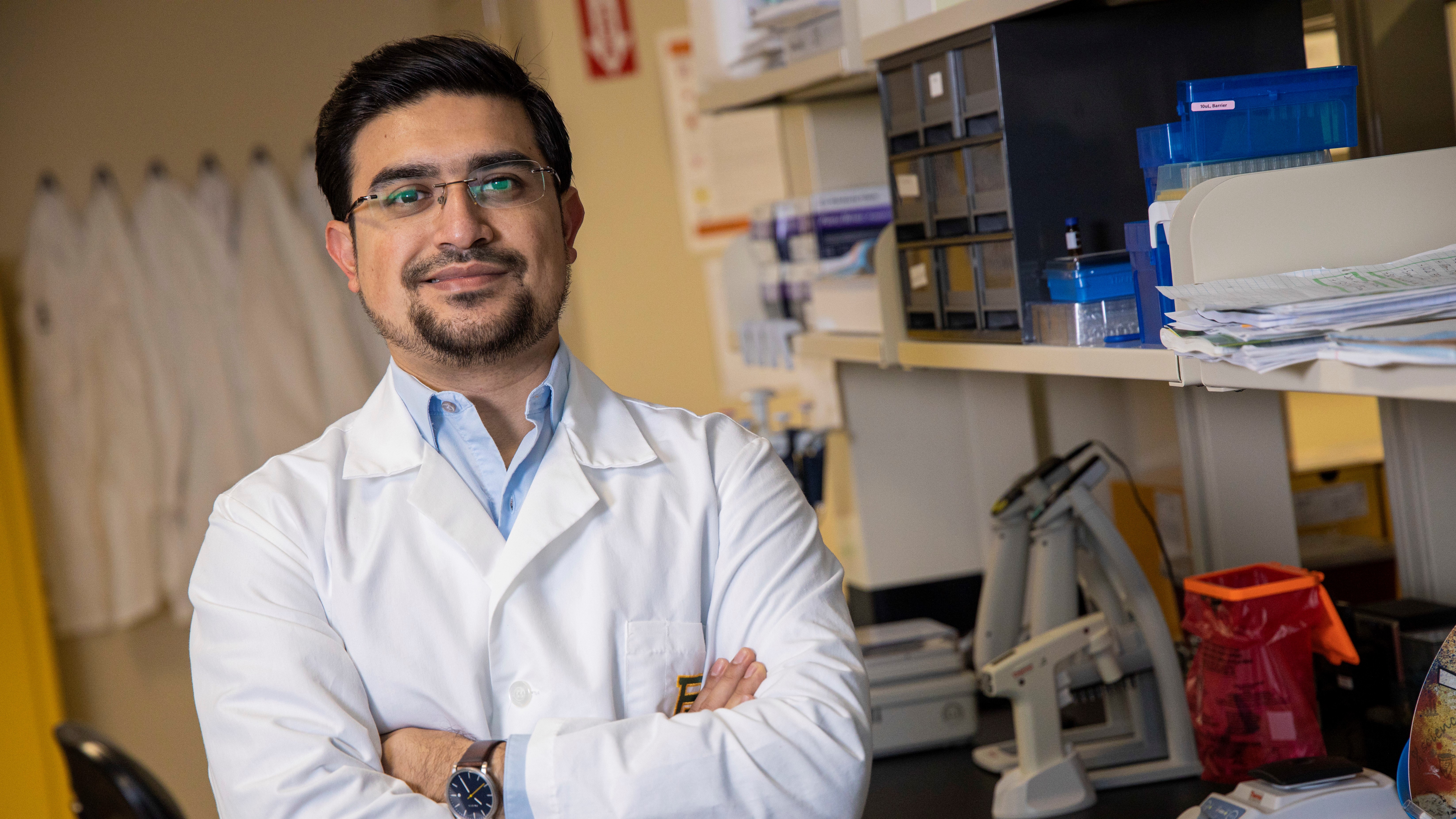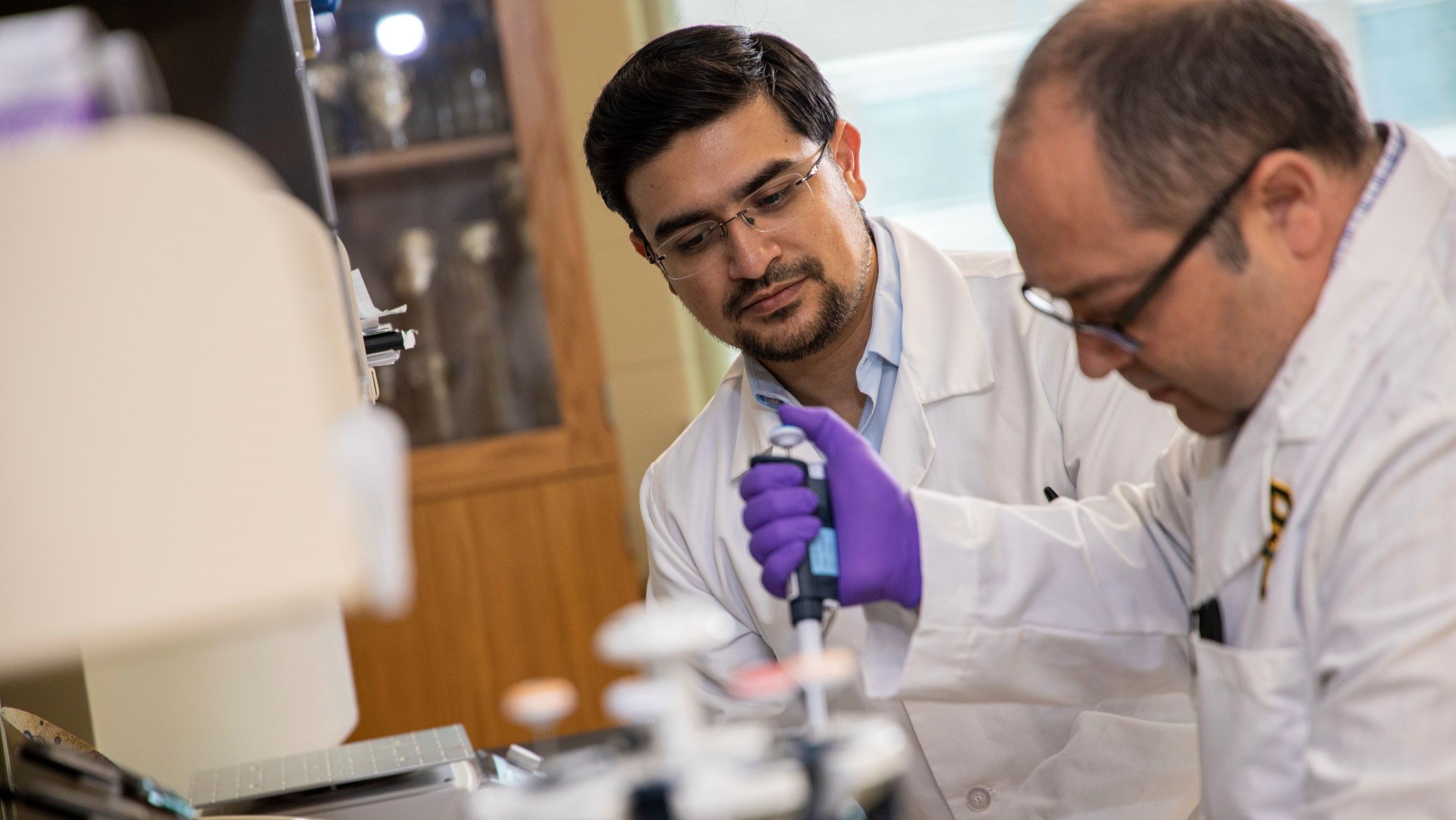Baylor Doctoral Candidate Receives Colgate-Palmolive Award for Alternative Methods Research in Toxicology


Media Contact: Lori Fogleman, Baylor University Media and Public Relations, 254-710-6275
Follow us on Twitter: @BaylorUMedia
by Cacey Vigil, student newswriter, Baylor University Media and Public Relations
WACO, Texas (Dec. 13, 2019) – Marco Franco, a doctoral candidate in environmental science at Baylor University, has been honored with the 2020 Colgate-Palmolive Award for Student Research Training in Alternative Methods from the Society of Toxicology.
The award is designed to enhance graduate student research training using in vitro methods or alternative techniques to replace the use of animals in toxicological research. Franco will be among the awardees honored March 15, 2020, during the SOT 59th Annual Meeting and ToxExpo. SOT is a professional and scholarly organization of scientists from academic institutions, government and industry with a mission to create a safer and healthier world by advancing the science and increasing the impact of toxicology.
“Toxicology is one of the strongest multidisciplinary fields that allows researchers to tackle questions from different approaches,” Franco said. “As our world continues to experience unprecedented levels of contamination from the overproduction of chemicals, toxicology provides us with the tools to address and minimize threats to humans’ and ecosystems’ health.”
Franco is a researcher in the environmental and molecular toxicology lab of Ramon Lavado, Ph.D., assistant professor of environmental science at Baylor, who conducts cutting-edge research with his students in aquatic toxicology, environmental health sciences and exposure and risk assessment.
As Baylor moves forward on its aspirations as a Research 1 university, environmental science faculty and students engage in cutting-edge scientific investigation on topics such as the impact of invasive species, pharmaceuticals in wastewater, use of wetlands for water treatment, organic air pollutants and the effects of chemical exposure on humans. Guided by the Illuminate strategic plan, Baylor aspires to transform lives around the world through ground-breaking research that addresses critical issues and creates a foundation for future discoveries.
“This student research award acknowledges Marco’s contribution in linking responses measured in living organisms to responses in cell and tissue cultures,” said George Cobb, Ph.D., professor and chair of environmental science at Baylor. “These advances in the mechanistic understanding of toxicant behavior use techniques considered to be the next generation of approaches when it comes to evaluating pharmaceuticals and chemical additives to commercial products. This is an important area of environmental research and discovery that aligns with Baylor’s Illuminate strategic plan and goals as a top research university.”
Franco’s research is on the development and integration of in vitro methods with whole-animal systems in order to expand the applicability of in vitro toxicity testing. This will allow him to evaluate the effects of environmental contaminants on aquatic organisms.
“My research uses cell-based methods in scenarios that range from understanding the estrogenicity of wastewater discharge in surface waters to investigating the biochemical mechanisms that allow organisms to adapt to heavily polluted environments,” Franco said.
With the funds provided by the Colgate-Palmolive award, Franco will have the opportunity to not only further his research, but to visit labs at the forefront of in vitro ecotoxicology and receive training from the scientists who have been leading the development of more advanced in vitro models to prioritize chemicals.
“The development and use of cell lines has been one of the major advances for in vitro toxicology,” Franco said. “Leaders in the field have started to look into ways to evaluate the toxicity of chemical compounds in more-complex systems, such as microfluidic models (biochips).”
As the search for animal alternatives continues to increase in the field of toxicology, Franco said he hopes to strengthen the use of in vitro systems for the evaluation of complex eco-toxicological scenarios, where organisms encounter multiple stressors at once.
“I hope to contribute to the efforts that have highlighted the value of cell-based technology and provide further evidence showing that good in vitro data can be universalized to in vivo responses,” Franco said. “In vitro systems are often less expensive and time consuming than traditional approaches in toxicology. Well-characterized models can be excellent tools for quick yet thorough evaluations of risks in threatened populations and ecosystems.”
For more information about environmental science at Baylor University, visit www.baylor.edu/environmentalscience.
ABOUT BAYLOR UNIVERSITY
Baylor University is a private Christian University and a nationally ranked research institution. The University provides a vibrant campus community for more than 17,000 students by blending interdisciplinary research with an international reputation for educational excellence and a faculty commitment to teaching and scholarship. Chartered in 1845 by the Republic of Texas through the efforts of Baptist pioneers, Baylor is the oldest continually operating University in Texas. Located in Waco, Baylor welcomes students from all 50 states and more than 90 countries to study a broad range of degrees among its 12 nationally recognized academic divisions.
ABOUT THE COLLEGE OF ARTS & SCIENCES AT BAYLOR UNIVERSITY
The College of Arts & Sciences is Baylor University’s oldest and largest academic division, consisting of 25 academic departments and seven academic centers and institutes. The more than 5,000 courses taught in the College span topics from art and theatre to religion, philosophy, sociology and the natural sciences. Faculty conduct research around the world, and research on the undergraduate and graduate level is prevalent throughout all disciplines. Visit www.baylor.edu/artsandsciences.